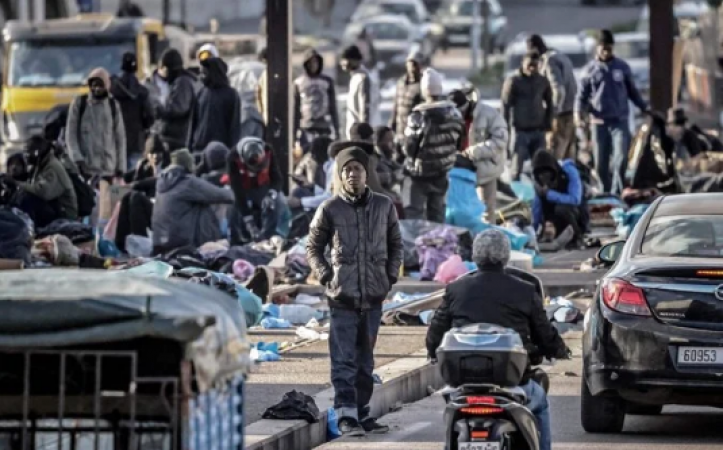
Casablanca: Five years ago, Oumar left his home in Guinea in search of a better life in Europe; However, he now lives in Morocco in a daily purge of hunger, cold and police brutality.
The 25-year-old said, "Just surviving every day is a battle.
Not having enough to eat, not having a roof over your head, not feeling safe and facing racism is very exhausting.
A bus station in Casablanca serves as a temporary home for hundreds of sub-Saharan Africans whose aspirations to travel to Europe have been blocked by Morocco. He spends his nights there.
Also Read: In a bipartisan vote, the US House commends Iranian protesters
We are chased away by the police early in the morning. Then we turn around and come back to the same place at the end of the day," Omar said. Like the other migrants interviewed in this report, Omar's name has been changed.
He has tried several times to reach Spanish territory from Morocco but has so far been unsuccessful. Oumar sits in front of the Oulad Xian bus station with a few dozen, mostly Guinean migrants, at the time of the assassination.
Some cook in makeshift kitchens, while others lie on the footpath. Someone has hung clothes and blankets to dry on a nearby wall.
Bakri, who is also from Guinea, claimed to have lived in the country for three years. "This is our depressing reality, but nobody wants to see it," said the 18-year-old.
Due to its proximity to the bus station, an important transport hub, the migrants decided to set up this temporary camp on the outskirts of the coastal "port city" with a population of 4.2 million.
Today, clashes with police often occur in poor neighborhoods. Six migrants were detained this month following a brawl during a police operation to remove campers at the site of a tramway extension.
Also Read: China claims that Covid deaths have decreased by almost 80%
They are now back in the same place, divided into groups according to their countries of origin, and everyone is working together to survive.
Malian Boubacar, 27, claimed that wherever we camp, they kick us out. We don't want to sleep on tram tracks, but there is no other option available.
Most of the locals resisted talking to a reporter, but a Moroccan sweets seller claimed that the expatriates "are now part of the landscape, they don't bother anyone."
Migrants can only wash their hands in station toilets.
Boubaker accused the residents of the neighborhood of racism, saying, "Sometimes they let us in, sometimes they don't."
Caritas, a Catholic charity, provides basic medical care and medicines to the migrants. The press in Morocco often expresses opposition to immigrants.
A recent headline in the weekly newspaper Maroc Hebdo proclaimed, "End clandestine immigration!," calling it "a social, security and political problem that the state is struggling to manage."
The migrants are facing "difficult conditions", according to Noureddine Riadi of AMDH, Morocco's largest human rights organisation. He urged the government to provide more assistance. "The temporary housing centers should be the most vulnerable," he said.
The heavily guarded Spanish enclave of Melilla is located on Morocco's north coast. Lamine, 20, made five attempts to enter and claims he almost gave up. We are fighting to keep our faith, but my optimism is diminishing by the day."
Many migrants enter Morocco through the country's desert border with Algeria, which is formally closed, and periodic steps have been taken to regularize their status.
However, it is coming under increasing pressure from Europe to tighten border controls and limit migrant movement within its borders.
According to the Spanish newspaper El Pais, the European Union is considering giving Rabat a grant of 500 million euros to address clandestine migration.
Around 32,000 migrants were detained by Moroccan police in 2022, and 566 people were arrested on suspicion of involvement in human trafficking.
Also Read: Man became 'wolf' by spending lakhs of rupees for mental peace
However, migrants in Casablanca claim they are still holding on to their hopes of traveling to Europe. According to Goat, going home would be "giving up". For me, it is either Europe or I die, he declared.